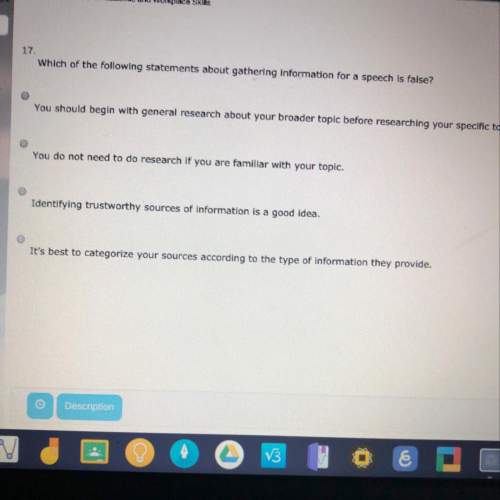

Answers: 1
Other questions on the subject: English

English, 21.06.2019 22:00, gaby4567
Read this excerpt from the exposition in "the monkey's paw." father and son were at chess, the former, who possessed ideas about the game involving radical changes, putting his king into such sharp and unnecessary perils that it even provoked comment from the white-haired old lady knitting placidly by the fire. what is one piece of information you can infer about the story from this sentence? a. the father in the story is possessed, so he probably says insane things a lot. b. the woman in the story is knitting, so the characters probably don't have good clothes to wear. c. the father is playing chess with the son, but the son is not old enough to know the rules. d. since the father likes taking risks in a game, he might like taking risks in life as well.
Answers: 1

English, 22.06.2019 00:00, booooooooooo37
The following question is based on your reading of a midsummer night’s dream by william shakespeare. why does puck transform bottom? a. to disrupt the play. c. to scare the mechanicals. b. for revenge on theseus. d. to scare the lovers.
Answers: 1

English, 22.06.2019 04:50, ilawil6545
Read the passage, then answer the question that follows. no one could have seen it at the time, but the invention of beet sugar was not just a challenge to cane. it was a hint—just a glimpse, like a twist that comes about two thirds of the way through a movie—that the end of the age of sugar was in sight. for beet sugar showed that in order to create that perfect sweetness you did not need slaves, you did not need plantations, in fact you did not even need cane. beet sugar was a foreshadowing of what we have today: the age of science, in which sweetness is a product of chemistry, not whips. in 1854 only 11 percent of world sugar production came from beets. by 1899 the percentage had risen to about 65 percent. and beet sugar was just the first challenge to cane. by 1879 chemists discovered saccharine—a laboratory-created substance that is several hundred times sweeter than natural sugar. today the sweeteners used in the foods you eat may come from corn (high-fructose corn syrup), from fruit (fructose), or directly from the lab (for example, aspartame, invented in 1965, or sucralose—splenda—created in 1976). brazil is the land that imported more africans than any other to work on sugar plantations, and in brazil the soil is still perfect for sugar. cane grows in brazil today, but not always for sugar. instead, cane is often used to create ethanol, much as corn farmers in america now convert their harvest into fuel. –sugar changed the world, marc aronson and marina budhos how does this passage support the claim that sugar was tied to the struggle for freedom? it shows that the invention of beet sugar created competition for cane sugar. it shows that technology had a role in changing how we sweeten our foods. it shows that the beet sugar trade provided jobs for formerly enslaved workers. it shows that sweeteners did not need to be the product of sugar plantations and slavery.
Answers: 1

English, 22.06.2019 10:40, jmanrules200
Read the passage. the dust bowl during the 1930s, extreme drought and high winds made life incredibly difficult in the great plains region of the united states. in many areas, rainfall was forty percent less than normal. the soil became extremely dry, and when strong winds blew, they created tremendous dust storms. these so-called “black blizzards” were so thick that they made daylight seem like dusk. during this terrible period, the great plains region of the united states was named the “dust bowl.” over the next few years, the drought continued, and the winds created more dust storms. in some places, the drought and high winds lasted for eight years. many people wondered if the black blizzards would ever end. which statement about this paragraph’s main idea is true? this paragraph’s main idea is stated in the topic sentence. there are not enough details to support the main idea. this paragraph’s main idea is implied. this paragraph does not express a main idea.
Answers: 2
Do you know the correct answer?
What does Wiesel mean by, “their eyes told him what he needed to know”...
Questions in other subjects:

Mathematics, 23.04.2020 07:59

English, 23.04.2020 07:59


Physics, 23.04.2020 07:59


Geography, 23.04.2020 07:59



Mathematics, 23.04.2020 07:59

Mathematics, 23.04.2020 07:59







